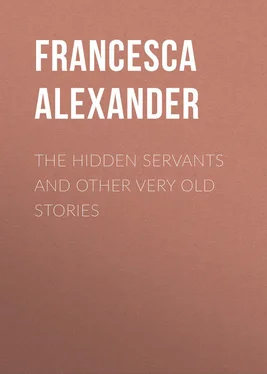Francesca Alexander - The Hidden Servants and Other Very Old Stories
Здесь есть возможность читать онлайн «Francesca Alexander - The Hidden Servants and Other Very Old Stories» — ознакомительный отрывок электронной книги совершенно бесплатно, а после прочтения отрывка купить полную версию. В некоторых случаях можно слушать аудио, скачать через торрент в формате fb2 и присутствует краткое содержание. Жанр: foreign_antique, foreign_prose, на английском языке. Описание произведения, (предисловие) а так же отзывы посетителей доступны на портале библиотеки ЛибКат.
- Название:The Hidden Servants and Other Very Old Stories
- Автор:
- Жанр:
- Год:неизвестен
- ISBN:нет данных
- Рейтинг книги:4 / 5. Голосов: 1
-
Избранное:Добавить в избранное
- Отзывы:
-
Ваша оценка:
- 80
- 1
- 2
- 3
- 4
- 5
The Hidden Servants and Other Very Old Stories: краткое содержание, описание и аннотация
Предлагаем к чтению аннотацию, описание, краткое содержание или предисловие (зависит от того, что написал сам автор книги «The Hidden Servants and Other Very Old Stories»). Если вы не нашли необходимую информацию о книге — напишите в комментариях, мы постараемся отыскать её.
The Hidden Servants and Other Very Old Stories — читать онлайн ознакомительный отрывок
Ниже представлен текст книги, разбитый по страницам. Система сохранения места последней прочитанной страницы, позволяет с удобством читать онлайн бесплатно книгу «The Hidden Servants and Other Very Old Stories», без необходимости каждый раз заново искать на чём Вы остановились. Поставьте закладку, и сможете в любой момент перейти на страницу, на которой закончили чтение.
Интервал:
Закладка:
Francesca Alexander
The Hidden Servants and Other Very Old Stories
Introduction
To those who are fortunate enough to know Miss Alexander's pen and pencil pictures of Italian peasant life the very name of Francesca, over which her early work was published, carries with it an aroma as of those humbler graces of her adopted people, – their sunny charity, their native sense of the beautiful, their childlike faith, – which touch the heart more intimately than all their great achievements in History and in Art. For those, however, to whom are yet unknown her faithful transcripts in picture and story from the lives of the people she loves, a word of introduction has been asked; and it was perhaps thought that the task might properly be entrusted to one who had heard The Hidden Servants and many another of these poems from the lips of Francesca herself.
Yet, rightly considered, could any experience have better served to banish from the mind such irrelevant intruders as facts, – those literal facts and data at least which the uninitiated might be so mistaken as to desire, but which none who knew Francesca's work could regard as of the slightest consequence?
Imagine a quiet, green-latticed room in Venice overlooking the Grand Canal whose waters keep time in gently audible lappings to the lilt of the verse, – that lilt that is apparent even in the printed line, but which only a voice trained to Italian cadences can perfectly give. Imagine that voice half chanting, half reciting, these old, old legends, and with an absolute sincerity of conviction which stirs the mind of the listeners, mere children of to-day though they be, to a faith akin to that which conceived the tales. Where is there place for facts in such a scene, in such an experience? Or, if facts must be, are not all that are requisite easily to be gleaned from the poems themselves? Why state that Francesca is the daughter of an American artist, or that she has spent her life in Italy, when the artist inheritance, the Italian atmosphere, breathes in every poem our little book contains? Why make mention even of Ruskin's enthusiastic heralding of her work, when the very spirit of it is so essentially that which the great idealist was seeking all his life that he could scarcely have failed to discover and applaud it had it been ever so retiring, ever so hidden? Nor does it matter that the Alexander home chances to be in Florence rather than in Venice, since it is Italy itself that lives in Francesca's work; nor that she is Protestant rather than Catholic, when it is religion pure and simple, unrestricted by any creed, that makes vital each line she writes or draws.
Yet of the poems, if not of the writer, there remained still something to learn, and accordingly a letter of inquiry was sent her; and her own reply, written with no thought of publication, is a better report than another could give. This is what she says: —
"With regard to this present collection of ballads, I can tell its history in a few words. When I was a young girl many old and curious books fell into my hands and became my favourite reading (next to the Bible, and, perhaps, the Divina Commedia ), as I found in them the strong faith and simple modes of thought which were what I liked and wanted. Afterwards, in my constant intercourse with the country people, and especially with old people whom I always loved, I heard a great many legends and traditions, often beautiful, often instructive, and which, as far as I knew, had never been written down. I was always in request with children for the stories which I knew and could tell, and, as I found they liked these legends, I thought it a pity they should be lost after I should have passed away, and so I always meant to write them down; all the more that I had felt the need of such reading when I was a child myself. But I never had time to write them as long as my eyes permitted me to work at my drawing, and afterwards, when I wanted to begin them, I found myself unable to write at all for more than a few minutes at once. Finally I thought of turning the stories into rhyme and learning them all by heart, so that I could write them down little by little. I thought children would not be very particular, if I could just make the dear old stories vivid and comprehensible, which I tried to do. If, as you kindly hope, they may be good for older people as well, then it must be that when the Lord took from me one faculty He gave me another; which is in no way impossible. And I think of the beautiful Italian proverb: 'When God shuts a door He opens a window.'"
After such an account of the origin and growth of these poems no further comment would seem fitting, unless it be that made by Cardinal Manning when writing to Mr. Ruskin in 1883 to thank him for a copy of Francesca's Story of Ida . He writes: —
"It is simply beautiful, like the Fioretti di San Francesco . Such flowers can grow in one soil alone. They can be found only in the Garden of Faith, over which the world of light hangs visibly, and is more intensely seen by the poor and the pure in heart than by the rich, or the learned, or the men of culture."
ANNA FULLER.Preface
In my upper chamber here,
Still I wait from year to year;
Wondering when the time will come
That the Lord will call me home.
All the rest have been removed, —
Those I worked for, those I loved;
And, at times, there seems to be
Little use on earth for me.
Still God keeps me – He knows why —
When so many younger die!
From my window I look down
On the busy, bustling town.
But beyond its noise and jar
I can see the hills afar;
And above it, the blue sky,
And the white clouds sailing by;
And the sunbeams, as they shine
On a world that is not mine.
Here I wait, while life shall last,
An old relic of the past,
Feeling strange, and far away
From the people of to-day;
Thankful for the memory dear
Of a morning, always near,
Though long vanished, and so fair!
Dewy flowers and April air;
Thankful that the storms of noon
Spent their force and died so soon;
Thankful, as their echoes cease,
For this twilight hour of peace.
But my life, to evening grown,
Still has pleasures of its own.
Up my stairway, long and steep,
Now and then the children creep;
Gather round me, where I sit
All day long, and dream, and knit;
Fill my room with happy noise —
May God bless them, girls and boys!
Then sweet eyes upon me shine,
Dimpled hands are laid in mine;
And I never ask them why
They have sought to climb so high;
For 'twere useless to enquire!
'Tis a story they desire,
Taken from my ancient store,
None the worse if heard before;
And they turn, with pleading looks,
To my shelf of time-worn books,
Bound in parchment brown with age.
Little in them to engage
Children's fancy, one would say!
Yet, when tired with noisy play,
Nothing pleases them so well
As the stories I can tell
From those pages, old and gray,
With their edges worn away;
Spelling queer, and Woodcut quaint.
Angel, demon, prince, and saint,
Much alike in face and air;
Houses tipping here and there,
Lion, palm-tree, hermit's cell,
And much more I need not tell.
Then they all attentive wait,
While the story I relate,
And, before the half is told,
I forget that I am old!
But one age there seems to be
For the little ones and me.
What though all be new and strange,
Little children never change;
All is shifting day by day, —
Worse or better, who can say?
Much we lose, and much we learn,
But the children still return,
As the flowers do, every year;
Just as innocent and dear
As those babes who first did meet
At our Heavenly Master's feet.
In His arms He took them all:
Oh, 'tis precious to recall —
Blessèd to believe it true —
That what we love He loved too!
Интервал:
Закладка:
Похожие книги на «The Hidden Servants and Other Very Old Stories»
Представляем Вашему вниманию похожие книги на «The Hidden Servants and Other Very Old Stories» списком для выбора. Мы отобрали схожую по названию и смыслу литературу в надежде предоставить читателям больше вариантов отыскать новые, интересные, ещё непрочитанные произведения.
Обсуждение, отзывы о книге «The Hidden Servants and Other Very Old Stories» и просто собственные мнения читателей. Оставьте ваши комментарии, напишите, что Вы думаете о произведении, его смысле или главных героях. Укажите что конкретно понравилось, а что нет, и почему Вы так считаете.












